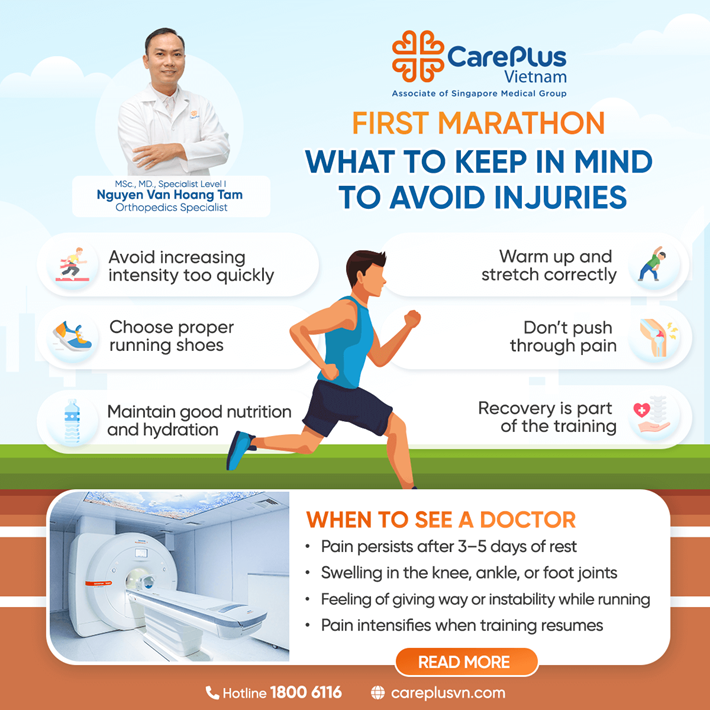FIRST MARATHON - WHAT TO KEEP IN MIND TO AVOID INJURIES
Preparing for a marathon journey isn’t just about physical training, it’s about understanding your body. Join CarePlus doctors to explore the common causes of running injuries, learn how to prevent them, and keep your body strong for a safe, fulfilling finish.

10/28/2025 9:15:58 AM
🏃 Joining your first marathon is an unforgettable milestone for any sports enthusiast. Yet without proper preparation, injuries can strike during training or even on race day, turning excitement into frustration and pain.
👉 Together with MSc., MD., Specialist Level I Nguyen Van Hoang Tam – Orthopedics Specialist at CarePlus, let’s walk through essential tips to protect your body and stay injury-free on your marathon journey.
1️⃣ Avoid increasing intensity too quickly
❗One of the most common mistakes among beginners is ramping up distance or speed too fast. The “10% rule” is a safe guideline — increase your total weekly mileage by no more than 10% compared to the previous week.
A sudden increase in training load gives your tendons, muscles, and bones no time to adapt, leading to overuse injuries such as:
🔸 Achilles tendinitis
🔸 Shin splints
🔸 Iliotibial band syndrome (ITBS)
2️⃣ Choose proper running shoes
Your shoes are your most important training partner. Choose a pair that fits well, suits your foot type (neutral, flat, or high-arched), and matches your running style.
👉 Avoid wearing brand-new shoes on race day. Break them in at least 2–3 weeks beforehand to let them mold naturally to your feet, preventing blisters and muscle soreness.
3️⃣ Warm up and stretch correctly
🔹 Before running: Spend 10–15 minutes warming up — ankle, knee, and hip rotations, light jumps, lunges, or squats.
🔹 After running: Do static stretches focusing on your quadriceps, hamstrings, calves, and hips to help muscles relax, recover faster, and reduce soreness.
4️⃣ Maintain good nutrition and hydration
Your body needs fuel and water to perform over long distances.
🔹 Before running: Eat a light meal 2–3 hours in advance, prioritizing easily digestible carbs like bread, bananas, or oats.
🔹 During running: Rehydrate every 20–30 minutes; for runs over 60 minutes, add electrolytes or energy gels.
🔹 After running: Refuel within 30 minutes with a mix of carbs and protein to support muscle recovery.
5️⃣ Listen to your body, don’t push through pain
Mild soreness after training is normal, but sharp, localized, or persistent pain signals potential injury.
👉 If the pain lasts more than 2–3 days, take a break and see a sports medicine specialist. Ignoring symptoms and continuing to train may turn minor injuries into chronic issues that take much longer to heal.
6️⃣ Recovery is part of the training
💪 Prioritize quality sleep, protein intake, massage, cold therapy, or recovery tools after long runs.
Schedule at least 1–2 full rest days each week, especially during intense pre-race training phases.
7️⃣ Train under realistic conditions
Before race day, do a long training run under similar conditions — same time of day, weather, nutrition, and gear. This helps your body adapt and prevents unexpected fatigue or discomfort during the real event.
🤔 When should you see a sports medicine doctor?
Seek medical attention if you experience:
🔸 Pain that doesn’t subside after 3–5 days of rest
🔸 Swelling in your knees, ankles, or feet
🔸 A sense of giving way or instability while running
🔸 Increasing pain when resuming training
Running a marathon is both a physical and mental challenge. Smart preparation, proper technique, and listening to your body are the keys to avoiding injury, maintaining performance, and enjoying every kilometer of the race.
✅ At CarePlus, our team of Orthopedic, Sports Medicine, and Musculoskeletal Specialists is here to help you assess your joints, muscles, and tendons, and design a personalized recovery plan to get you back on track safely.
✅ With state-of-the-art technology including MRI and CT scan powered by AI, CarePlus ensures quick, comfortable screening and crystal-clear diagnostic results, empowering doctors to deliver precise assessments and tailored treatment plans for every runner.
🏃♂️ Run with passion, but don’t let injuries stop you.
📞 Book your musculoskeletal health check today with CarePlus and make your marathon journey strong, safe, and complete.
CAREPLUS INTERNATIONAL CLINICS
Associate of Singapore Medical Group
Hotline: 1800 6116
Email: info@careplusvn.com
Fanpage: CarePlus Clinic Vietnam